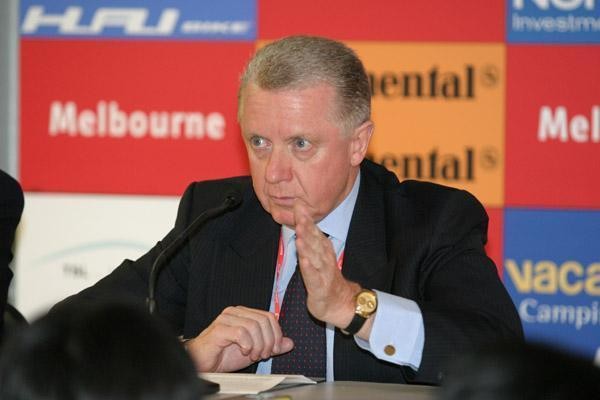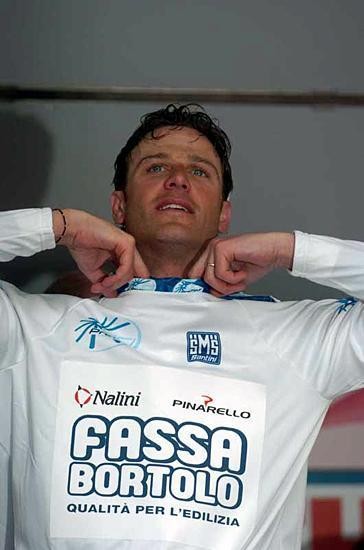Getting a grip on the ProTour
ProTour. How can one word be the subject of so much debate, confusion, delight (mainly from the...



News feature, March 31, 2005
ProTour. How can one word be the subject of so much debate, confusion, delight (mainly from the UCI), and angst (mainly by ASO)? Politics and polemics aside, Cyclingnews' Anthony Tan does his best to explain the workings of the ProTour's points system.
Based solely on the current economic climate, the most radical reform of modern-day road cycling could be argued as being necessary. Wooing big-time sponsors to fund a professional cycling team isn't easy, although it seems cycling has moved on from the bad patch that was largely a consequence of the Festina doping scandal that broke at the 1998 Tour de France.
Despite more high-profile instances of drug-abuse, Hein Verbruggen, President of the International Cycling Union (UCI), appears to have sensed an upward trend in people's minds, along with a need to make cycling more attractive to the public, more appealing to investors, and to develop cycling outside of old Europe. These aforementioned needs were the impetus behind the creation of the ProTour.
Like it or not, the UCI ProTour is a reality, and regardless of the infighting and outfighting, the rules and framework are now in place. So, rather than discuss politics and polemics, we're going to attempt to explain to you the rules and points system behind the ProTour - hopefully in the simplest way possible! Here goes...
The Teams
20 teams have all paid a substantial sum of money (100,000 Euros was the deposit required) to be part of the ProTour. Based on strict sporting, financial and ethical criteria, these 'UCI ProTeams' have obtained a ProTour licence for a maximum duration of four years - you can see the current list by clicking here, which takes you to our 2005 teams database.
Get The Leadout Newsletter
The latest race content, interviews, features, reviews and expert buying guides, direct to your inbox!
All ProTeams must take part in all ProTour races, which guarantees a certain quality and depth of participation in each of the 27 events that comprise the ProTour calendar. However, each rider is not obligated to race in every ProTour event. In fact, in some cases, this would be physically impossible; for example, dates for this year's Paris-Nice and Tirreno-Adriatico overlapped each other by a few days.
UCI Professional Continental Teams, the second rung in the ProTour hierarchy, mainly compete in races that belong to each of the five separate UCI Continental Circuits, although they can take part in a limited number of ProTour events - but only if they're invited by the race organiser.
Points system/rankings
The ProTour circuit is comprised of three distinct classifications: an individual ranking, and team ranking, and a nation's ranking.
Only riders belonging to ProTour teams can score points in ProTour races. So Ruggero Marzoli, who rides for Professional Continental Team Acqua & Sapone, takes zero ProTour points with him, despite finishing an excellent seventh place at this year's Milano-Sanremo. Had Marzoli ridden for Liquigas-Bianchi, however, he would have earned 15 points for his efforts.
Individual classifcation
ProTour riders score points according to the following scale, with the leader of the individual ranking wearing a predominantly white jersey that Stuart O'Grady thought 'could do with a revamp'. Now that you mention it, Stuey, It does look awfully similar to the best young rider's jersey at Le Tour...
Oscar Freire was the first rider to don 'Le maillot de leader de l'UCI ProTour' after winning three stages and the overall in Tirreno-Adriatico, and was obliged to wear it at the following weekend's Milano-Sanremo ProTour race, despite his reservations.
This rule, however, is about to change: a new guideline, bestowing the world champion the right to wear the jersey even if he's leading the ProTour, is scheduled to become official before this weekend's Tour of Flanders on April 3. Though with Alessandro Petacchi taking the lead after his stunning win in Sanremo, the guideline becomes redundant for the time being.
It's clearly obvious the individual points scale favours the Classics star by far, with 50 points for a win; to a lesser extent the Tour rider, who can place high on the overall classification on more than one occassion; and to a much lesser extent the sprinter, who gets a measly 3 points for a stage win in any of the Grand Tours, or a bite-sized 1 point for a stage win at a race like Paris-Nice.
So far, though, Petacchi, the purest of sprinters, looks set to keep his ProTour jersey for a while yet. Ale-Jet won three stages (3 points) and finished second overall (40 points) at Tirreno-Adriatico, then backed it up with a stunning win in Sanremo (50 points) to take the lead in the competition with 93 points.
At the moment, the La Spezia speedster enjoys a 15 point buffer over Freire (78 points) and is 20 clear of Danilo Hondo (70 points), with Paris-Nice winner Bobby Julich some way behind in fourth with 50 points to his credit. With 24 ProTour races still remaining, however, time will tell if the points system is a fair one.
ProTour Individual classification points scale; Individual ProTour rankings
Team classification
ProTour teams are awarded points based on the first three riders crossing the line in one-day races, and their final ranking in stage races (based on the teams classification system currently in place). Unlike the individual ProTour points system, however, the ProTeams scoring system is much more straightforward, with equal weight given to each of the 27 events on the ProTour calendar. But like the individual ProTour points system, non-ProTour teams will not receive points, irrespective of their position in ProTour events.
ProTour Team classification points scale; ProTour Team rankings
Country classification
This is the easiest ranking to get your head around. To determine a nation's ranking on the ProTour, simply add up the five best riders on the ProTour overall individual classification when the rankings are released. Not surprsingly, with Spaniards and Italians dominant in the early ProTour races, they're well ahead of the rest (174 and 155 points respectively); Germany (127 points), the USA (70) and Australia (40) round out the top five.
Points scales
Individual classification
Team classification
The 2005 UCI ProTour calendar
March
April
May
June
July
August
September
October